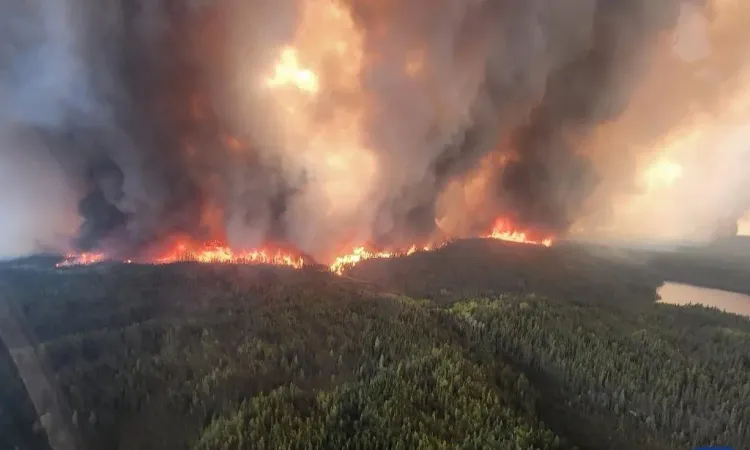Could Wildfire Smoke Be Impacting Air Quality Across Canada?

Synopsis
Key Takeaways
- Wildfire smoke has led to widespread air quality alerts.
- Mandatory evacuations are affecting approximately 17,000 residents.
- Health risks increase with rising smoke levels.
- Authorities recommend limiting outdoor activities.
- States of emergency have been declared in multiple provinces.
Ottawa, May 30 (NationPress) Wildfire smoke has prompted air quality alerts in six provinces and territories throughout Canada, as reported by Environment Canada's weather update released on Friday.
The agency issued alerts in two adjacent provinces, Saskatchewan and Manitoba, both of which declared states of emergency just one day apart.
Saskatchewan Premier Scott Moe announced a 30-day provincial state of emergency on Thursday, indicating that over 15 communities, primarily in the northern area, have been evacuated. He noted that more than 40 structures have been lost.
His counterpart in Manitoba, Wab Kinew, made a similar declaration on Wednesday, mandating the evacuation of approximately 17,000 people, according to reports from Xinhua news agency. "Smoke is causing extremely poor air quality and diminished visibility. As smoke levels rise, health risks escalate," warned Environment Canada.
"Limit time spent outdoors. Consider postponing or rescheduling outdoor sports, activities, and events," the agency advised, urging individuals in affected areas to keep windows and doors secured, use air filtration systems indoors, and wear masks when outside.
Warm and dry weather continues to facilitate wildfire activity as the weekend draws near. The smoke is expected to persist for an extended period near the fire sources, the report indicated.
Earlier this week, Manitoba, one of Canada's three Prairie Provinces, declared a state of emergency due to severe wildfire conditions and threats.
Premier Wab Kinew revealed in a news release that the state of emergency was declared based on recommendations from Manitoba's wildfire and emergency management officials.
"Given the intensifying wildfires in northern Manitoba, our government has declared a provincewide state of emergency to navigate this crisis," stated Kinew.
The city of Flin Flon, along with the First Nations of Pimicikimak and Mathias Colomb, also issued mandatory evacuation orders affecting around 17,000 individuals. All residents and visitors must evacuate these communities as soon as possible before midnight.
"This is the largest evacuation in many Manitobans' living memory and will require substantial resources and cooperation from all levels of government," he said.
The premier mentioned he had contacted Canadian Prime Minister Mark Carney to request support from the Canadian Armed Forces in assisting with the transportation of evacuees.
Kinew indicated that most evacuees would be directed to the provincial capital, Winnipeg, where they will be accommodated in large facilities such as soccer fields and arenas.
The state of emergency will initially last for 30 days upon declaration and may be extended if deemed necessary. This ensures that federal, provincial, and local resources can be organized effectively to protect Manitobans, the premier noted.









